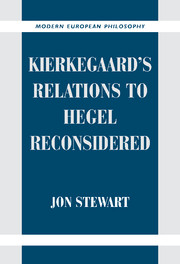Book contents
- Frontmatter
- Contents
- Acknowledgements
- Abbreviations of Primary Texts
- Preface
- Introduction
- 1 Kierkegaard and Danish Hegelianism
- 2 Traces of Hegel in From the Papers of One Still Living and the Early Works
- 3 The Ironic Thesis and Hegel's Presence in The Concept of Irony
- 4 Hegel's Aufhebung and Kierkegaard's Either/Or
- 5 Kierkegaard's Polemic with Martensen in Johannes Climacus, or De omnibus dubitandum est
- 6 Kierkegaard's Repetition and Hegel's Dialectical Mediation
- 7 Hegel's View of Moral Conscience and Kierkegaard's Interpretation of Abraham
- 8 Martensen's Doctrine of Immanence and Kierkegaard's Transcendence in the Philosophical Fragments
- 9 The Dispute with Adler in The Concept of Anxiety
- 10 The Polemic with Heiberg in Prefaces
- 11 Subjective and Objective Thinking: Hegel in the Concluding Unscientific Postscript
- 12 Adler's Confusions and the Results of Hegel's Philosophy
- 13 Kierkegaard's Phenomenology of Despair in The Sickness unto Death
- 14 Kierkegaard and the Development of Nineteenth-Century Continental Philosophy: Conclusions, Reflections, and Reevaluations
- Foreign Language Summaries
- Bibliographies
- Subject Index
- Index of Persons
12 - Adler's Confusions and the Results of Hegel's Philosophy
Published online by Cambridge University Press: 13 March 2010
- Frontmatter
- Contents
- Acknowledgements
- Abbreviations of Primary Texts
- Preface
- Introduction
- 1 Kierkegaard and Danish Hegelianism
- 2 Traces of Hegel in From the Papers of One Still Living and the Early Works
- 3 The Ironic Thesis and Hegel's Presence in The Concept of Irony
- 4 Hegel's Aufhebung and Kierkegaard's Either/Or
- 5 Kierkegaard's Polemic with Martensen in Johannes Climacus, or De omnibus dubitandum est
- 6 Kierkegaard's Repetition and Hegel's Dialectical Mediation
- 7 Hegel's View of Moral Conscience and Kierkegaard's Interpretation of Abraham
- 8 Martensen's Doctrine of Immanence and Kierkegaard's Transcendence in the Philosophical Fragments
- 9 The Dispute with Adler in The Concept of Anxiety
- 10 The Polemic with Heiberg in Prefaces
- 11 Subjective and Objective Thinking: Hegel in the Concluding Unscientific Postscript
- 12 Adler's Confusions and the Results of Hegel's Philosophy
- 13 Kierkegaard's Phenomenology of Despair in The Sickness unto Death
- 14 Kierkegaard and the Development of Nineteenth-Century Continental Philosophy: Conclusions, Reflections, and Reevaluations
- Foreign Language Summaries
- Bibliographies
- Subject Index
- Index of Persons
Summary
A work that affords an indirect yet useful glimpse of Kierkegaard's view of Hegel is his unpublished The Book on Adler (also translated under the title On Authority and Revelation). Kierkegaard started work on it in May of 1846, only a few months after the Concluding Unscientific Postscript appeared and the authorship was to come to an end. It was revised off and on over the next several years. The main discussion of the work concerns the purported revelation of the Danish priest, Adolph Peter Adler. Prior to his revelation, Adler was a convinced Hegelian, and Kierkegaard argues that Adler's confused state of mind is, at least in part, a result of a Hegelian influence. Thus, in this work Kierkegaard discusses Hegel and Hegelianism indirectly in a number of places. These passages must be examined in order to sketch a general picture of Kierkegaard's assessment of Hegel during this period immediately after the Postscript. Moreover, there are reasons to believe that Kierkegaard's picture of Hegel's philosophy might have been in large measure derived from Adler's expositions of it. Thus, Kierkegaard's relation to Adler is doubly important for the purposes of this investigation.
Kierkegaard had previously criticized Adler in The Concept of Anxiety. As was seen previously, the main work under scrutiny there was Adler's Popular Lectures on Hegel's Objective Logic. Although Adler is never mentioned directly in the work, Kierkegaard has his pseudonym Vigilius Haufniensis criticize Adler's use of Christian doctrines in his explication of Hegel's logic.
- Type
- Chapter
- Information
- Kierkegaard's Relations to Hegel Reconsidered , pp. 524 - 549Publisher: Cambridge University PressPrint publication year: 2003

